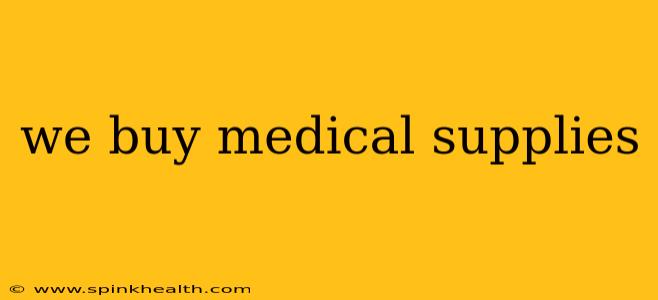We Buy Medical Supplies: Navigating the Complexities of the Medical Surplus Market
The world of medical supplies is a vast and intricate landscape. From everyday necessities like bandages and gloves to sophisticated diagnostic equipment and surgical instruments, the sheer volume and variety can be overwhelming. But for those in the business of buying medical supplies, particularly surplus or used equipment, the opportunities can be significant. This journey isn't just about finding a bargain; it's about understanding the regulations, ensuring quality, and navigating a market with unique challenges.
My name is Alex, and for over 15 years, I've been immersed in the medical supply industry, witnessing firsthand the dynamic shifts and intricacies of this sector. I've seen everything from small clinics sourcing basic supplies to large hospital systems managing multi-million-dollar inventories. My goal here is to shed light on the complexities of buying medical supplies, particularly within the used or surplus market, so you can approach this endeavor with confidence and knowledge.
What Types of Medical Supplies are Commonly Bought and Sold?
This is a broad question, and the answer depends heavily on the buyer's needs. However, some commonly traded items include:
- Consumables: Bandages, gauze, gloves, syringes, needles, disinfectants, and other disposable items are consistently in demand. The market for used consumables is limited due to hygiene regulations, but surplus or overstocked items are frequently available.
- Equipment: This category encompasses a vast range, from simple stethoscopes and blood pressure cuffs to sophisticated imaging machines like X-ray units and ultrasound scanners. The used equipment market is significant, offering considerable cost savings, but careful inspection and verification are crucial.
- Furniture: Examination tables, hospital beds, wheelchairs, and other medical furniture are also bought and sold, often at a fraction of the cost of new items. Condition and functionality are key considerations here.
- Pharmaceuticals: While the sale of pharmaceuticals is heavily regulated, surplus or expired medications (for proper disposal) can sometimes be acquired. This requires strict adherence to legal guidelines and ethical disposal practices.
Where Can I Find Medical Supplies to Buy?
Sourcing medical supplies requires a multifaceted approach. Here are some key avenues to explore:
- Liquidation Auctions: Hospitals, clinics, and other healthcare facilities often liquidate surplus or outdated equipment through auctions. These can be online or in-person events, offering opportunities to find significant bargains.
- Online Marketplaces: Numerous online platforms specialize in the sale of used or surplus medical equipment and supplies. These platforms often provide detailed descriptions and images, but thorough due diligence remains crucial.
- Direct from Healthcare Facilities: Contacting hospitals and clinics directly can be fruitful. They may have surplus items they’re willing to sell or trade.
- Medical Equipment Dealers: Many companies specialize in buying and selling used medical equipment. These dealers typically offer warranties and service options, providing an extra layer of security.
What are the Important Legal and Regulatory Considerations?
Navigating the legal landscape is critical. Buying and selling medical supplies involves considerations like:
- FDA Regulations: Compliance with Food and Drug Administration (FDA) regulations is paramount, especially when dealing with used or refurbished equipment. Understanding the regulations concerning the resale of medical devices is non-negotiable.
- State Licensing: Some states may require licenses or permits to buy, sell, or refurbish certain types of medical equipment. Research your local regulations thoroughly.
- HIPAA Compliance: If dealing with equipment that handles patient data, adherence to HIPAA (Health Insurance Portability and Accountability Act) regulations is essential to protect patient privacy.
- Proper Disposal: Safe and environmentally sound disposal of outdated or unusable medical supplies is a vital responsibility. Understand the local regulations for disposing of medical waste.
How Can I Ensure the Quality and Safety of Used Medical Supplies?
Buying used equipment presents inherent risks. To mitigate these risks:
- Thorough Inspection: Before purchasing, conduct a comprehensive inspection of the equipment. Check for functionality, wear and tear, and any potential safety hazards.
- Verification of Certification: Ensure that the equipment meets all relevant safety and performance standards. Look for certifications and approvals from relevant bodies.
- Service History: Request service records or maintenance logs to assess the equipment's history and condition.
- Warranty: If possible, seek a warranty from the seller to protect your investment.
Buying medical supplies, especially used ones, demands careful planning, research, and due diligence. By understanding the market dynamics, legal requirements, and quality assurance measures, you can navigate this complex landscape effectively and responsibly. Remember, prioritizing safety and compliance should always be your top priority. This comprehensive approach will ensure your success in this vital sector.

